It is completely normal for a mom dog to carry her puppies in her mouth. However, there are a few reasons why she is doing this.
In the wild, the mother dog would carry her puppies in her mouth to change their location to protect her puppies. But that is not the case with domestic dogs.
Key Takeaway
- A mother dog may carry her puppies in her mouth due to her innate need to create a safe sleeping environment, to move them from place to place, to discipline them, or because she may feel threatened and is being protective.
- It’s normal for mother dogs to carry their puppies in their mouths as part of their instinctual behavior to protect, move, or even discipline their young.
- You should not stop your dog from carrying her puppies in her mouth unless she’s causing harm, as it’s a natural behavior for mother dogs to carry their puppies to protect, move, or discipline them.
- To create a comfortable environment so a dog doesn’t feel the need to move her puppies, set up a secure, quiet space with clean bedding, ensure easy access to food and water, and minimize disturbances, which can help the mother dog feel safe and relaxed.
Understanding Maternal Instincts in Dogs
Maternal instincts in dogs involve a range of behaviors, such as cleaning, nursing, and protecting their puppies, all driven by the primal need to ensure the safety and survival of their litter.
Immediately after birth, the mother dog will start to clean her puppies.
This serves a dual purpose – it stimulates the puppies to breathe and also helps to remove the birthing fluids, keeping the puppies clean and reducing the chances of infection.
As a veterinarian, I’ve seen this instinctual behavior countless times, and it’s always amazing to observe.
Protection is a fundamental part of a mother dog’s maternal instincts. She will safeguard her puppies from perceived threats, often moving them to safer locations if she senses danger.
This behavior is driven by the primal need for the survival of her litter. In my practice, I’ve seen mother dogs exhibit extraordinary protective behaviors, illustrating the deep bond they share with their offspring.
Why Is My Dog Carrying Her Puppies In Her Mouth?
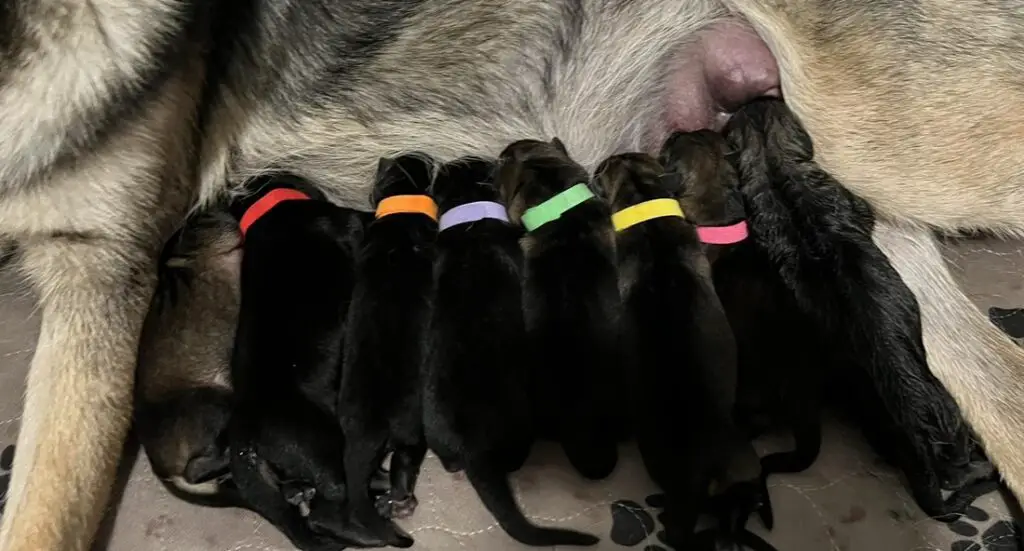
A mother dog carries her puppies in her mouth as part of her instincts to protect them, transport them, discipline them, or create a safe sleeping environment.
1. She is moving them closer to the human family
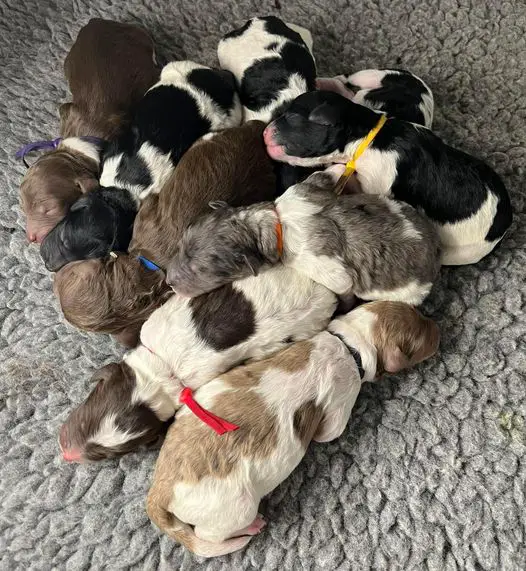
Dogs are undeniably loving and loyal animals. So, it’s not surprising that they desire the same level of nurturing and closeness with their puppy families.
A mother dog is carrying her puppies in her mouth as a way to show them affection and get them close to you. That is the closest she can come to cuddling.
By carrying each pup, she ensures that all get an equal amount of attention from her and the human family around.
This primal behavior is an extension of motherly love and shows how deeply ingrained parental instincts can be in our beloved pets.
2. The mom is moving them to a quieter place
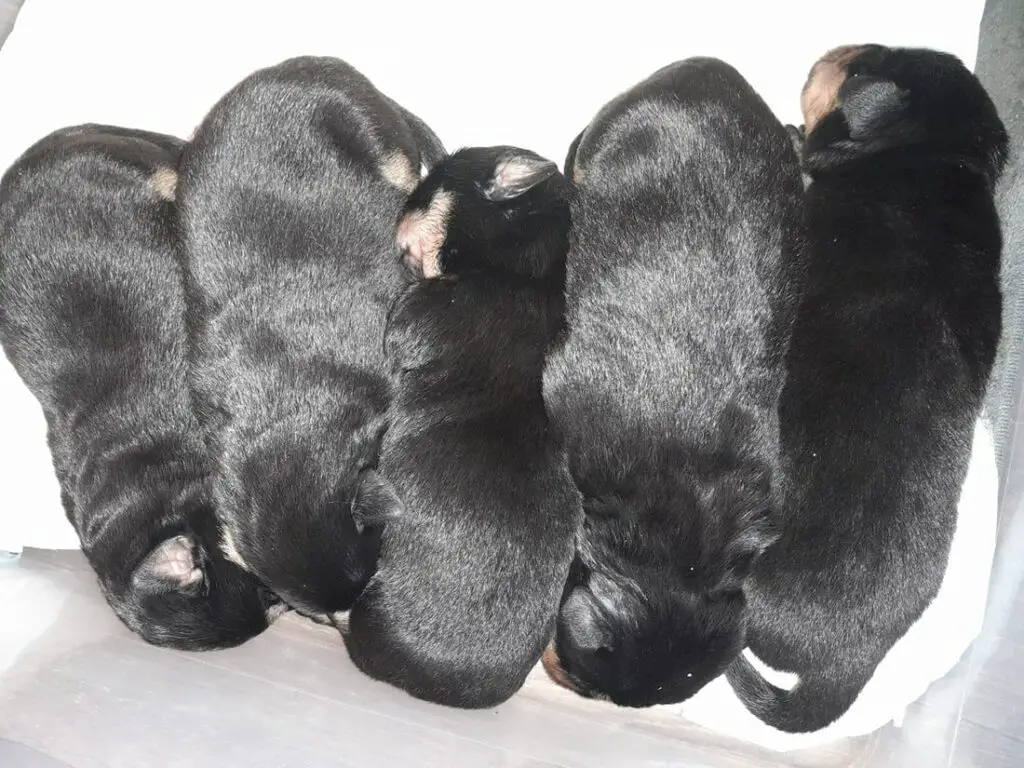
Dog mothers often express an astonishing level of maternal instinct towards their puppies. This involves a range of behaviors from protection to simply providing comfort.
One of these behaviors is the mysterious habit of carrying her puppies in her mouth. It is prompting pet owners to puzzle over why this seemingly strange behavior is exhibited.
As it turns out, the answer is quite natural. A mother dog may carry her pups in her mouth as part of her innate need to create a safe sleeping spot for them away from any dangers. This involves finding a quiet and secure place with minimal disturbances that she can relocate to.
Upon arriving at their new destination, the puppies will be gently placed down so they can settle into their new den and rest peacefully – all thanks to mom’s thoughtful care!
3. She is moving the pups to a warmer place
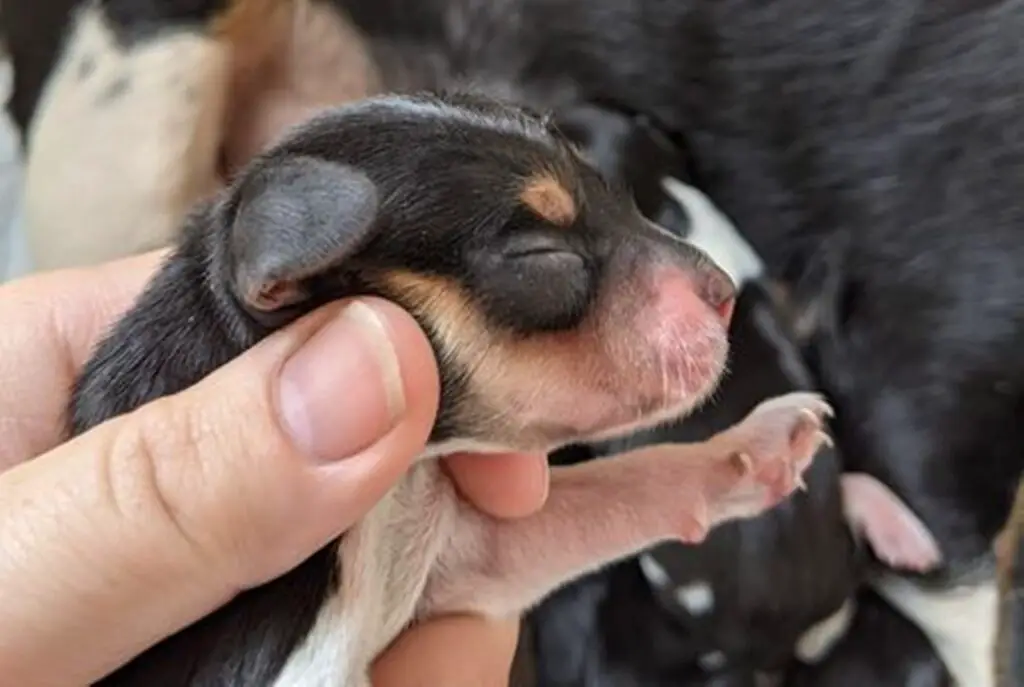
Dogs have an instinct to take care of their puppies, and one way they do this is by carrying them in their mouths. If a momma dog notices her puppies are feeling cold, she’ll scoop them up in her mouth and move them to a warmer place.
It might look strange to humans. But, it’s just part of the mothering process for dogs – and many other animals as well!
Making sure newborn puppies are comfortable and safe requires providing the perfect environment. In terms of temperature, the room should be kept at approximately 80 degrees Fahrenheit with some variation depending on the type of puppy.
Too high of a temperature increases the risk of respiratory issues. Too low can lead to hypothermia, or even death in extreme cases.
4. She may simply prefer another spot
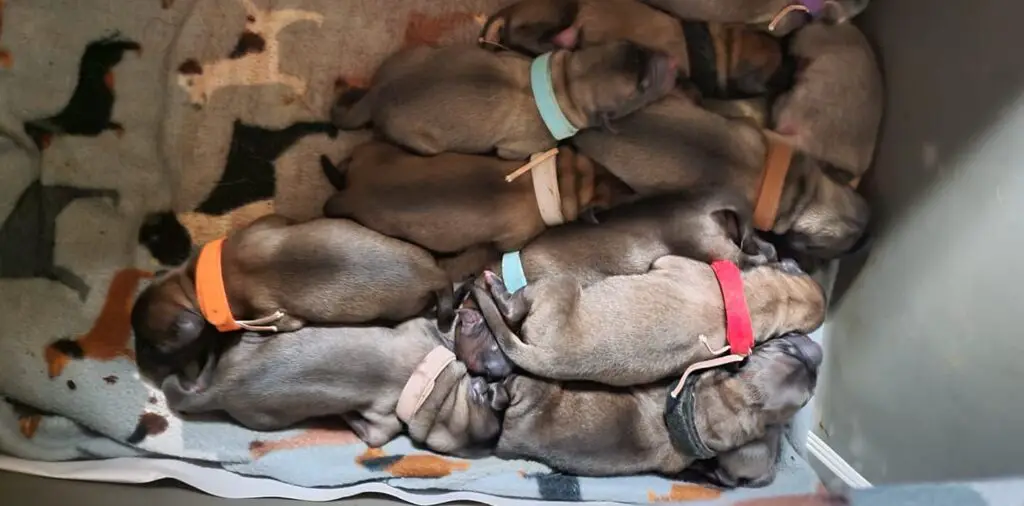
A mother dog will carry her puppies in her mouth if she feels the current spot is not good enough. A mother dog wants only the best for her newborn puppies.
She will make sure that they are warm enough, in a quiet place where they can rest, and most importantly they are in a comfortable place. If some of the requirements are not met, the mom will pick up her puppies and carry them somewhere else.
5. The current spot might be too dirty
Did you know that newborn puppies urinate every two hours and need to poo up to five times a day? And because they are too young to walk, they do it where they sleep.
Over time, the mother will notice that the current spot has become too dirty from pee and poo and will pick up the puppies with her mouth and will carry them to a cleaner location.
Is It Normal For Mother Dogs To Carry Their Puppies In Their Mouths?
It is indeed normal for mother dogs to carry their puppies in their mouths, as this is a natural behavior intended to protect and transport their young.
Mother dogs carrying their puppies in their mouths is a behavior rooted in their instincts. It’s a way for them to move their puppies to safety, protect them from perceived threats, or simply rearrange them while nursing.
This behavior is particularly common during the first few weeks after birth when the puppies are still unable to move around on their own.
However, it’s crucial to observe this behavior closely to ensure that it doesn’t result in harm to the puppies. If the mother dog appears to be overly rough or anxious while carrying her puppies, or if the puppy shows signs of distress or injury, it may be necessary to intervene.
Can a Mother Dog Hurt Her Puppies By Carrying Them in Her Mouth?
While it is rare, a mother dog can potentially hurt her puppies by carrying them in her mouth if she is overly anxious or rough.
Mother dogs are generally very careful and gentle when carrying their puppies. They instinctively know how to hold the puppy’s neck lightly with their mouths to avoid causing harm.
However, in some cases, particularly if the mother dog is inexperienced or overly anxious, she may grip too hard or drop the puppy, which can lead to injuries.
It’s important to observe this behavior closely. If the mother appears excessively nervous or if the puppies show signs of distress or injury such as crying, limping, or visible wounds, it may be necessary to intervene and seek veterinary help.
Health Implications For Puppies Being Carried Around
While being carried in their mother’s mouth is a natural part of a puppy’s life, it does come with certain health implications, such as potential injuries, and understanding the symptoms and necessary actions for a frail chest in puppies is crucial.
Risks of Being Carried
Being carried in the mouth does pose some risk to puppies. In some cases, the mother dog might accidentally injure the puppy if she grips too tightly or drops the puppy from a height.
Warning signs of potential injury include crying or whimpering from the puppy, unusual behavior, limping, or visible wounds.
As a vet, I’ve seen instances where puppies have been injured this way, and immediate veterinary care is advised to ensure no serious harm has occurred.
Frail Chest in Puppies
A condition often seen in puppies is a frail or ‘flat’ chest, also known as Pectus Excavatum. This condition can make it difficult for puppies to breathe and may affect their growth and development.
Symptoms to look out for include a visibly flattened chest, difficulty breathing, lack of appetite, or failure to gain weight.
If you notice any of these symptoms in your puppy, immediate veterinary attention is needed. Treatment options vary depending on the severity of the condition but may include physical therapy or surgery in severe cases.
During my time as a veterinarian, I’ve treated several puppies with this condition and seen them go on to lead healthy lives with appropriate care and treatment.
Should I Stop My Dog From Carrying Her Puppies In Her Mouth?
Generally, it’s best not to stop a mother dog from carrying her puppies in her mouth, as this is a natural behavior that serves important purposes.
Mother dogs carry their puppies in their mouths as an instinctive part of caring for their young. This behavior allows them to move their puppies around, protect them from perceived dangers, and arrange them for nursing.
It’s typically a safe and gentle action, with the mother dog knowing instinctively how to hold her puppies without hurting them.
However, if you notice that the mother dog seems overly anxious, is constantly moving the puppies, or the puppies seem distressed, it might be time to intervene.
In such cases, it’s advisable to consult with a vet or a professional dog behaviorist to guide you on the best course of action.
In my experience as a vet, I’ve found that while this behavior is generally beneficial for the puppies’ development, there can be instances where intervention may be necessary for their safety.
Therefore, always keep a close eye on your pets’ behavior and seek professional advice when in doubt.
Managing The Mother Dog’s Behavior After Birth
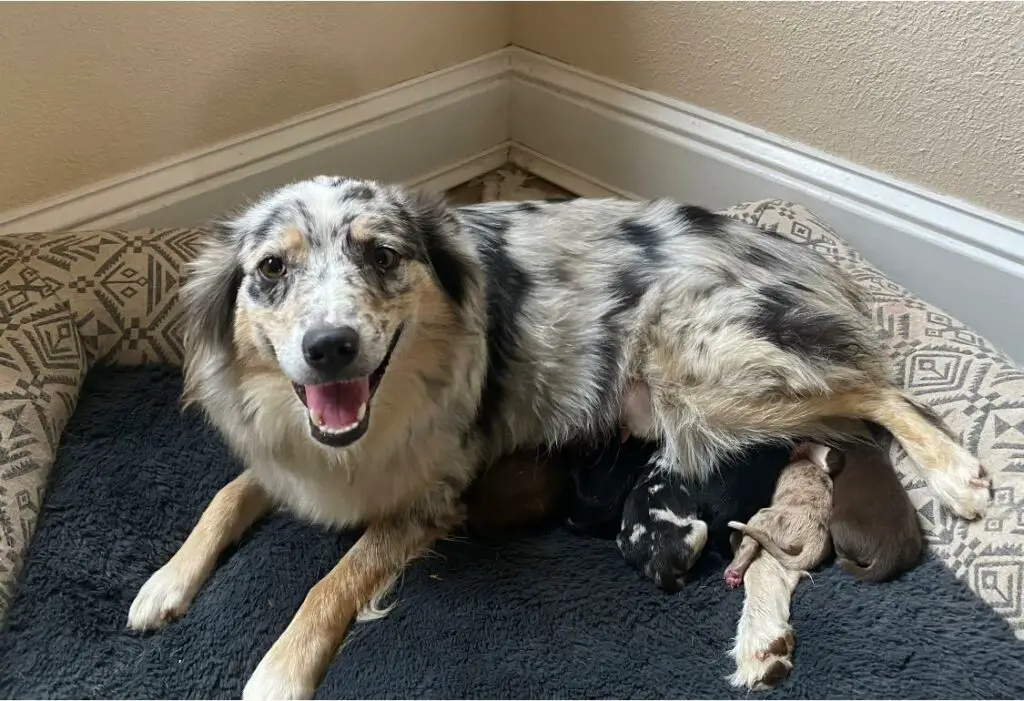
The behavior of a mother dog carrying her puppies in her mouth can be influenced by several factors, including the whelping environment, the need for intervention during interactions with puppies, and addressing issues of overprotectiveness or neglect.
Providing a Suitable and Stress-Free Whelping Environment
A stress-free and suitable whelping environment is key to managing a mother dog’s behavior. It should be quiet, warm, and comfortable, allowing the mother to feel secure while she cares for her puppies.
In my veterinary practice, I’ve seen that a suitable environment can significantly reduce the chances of the mother dog moving her puppies excessively or becoming overly protective.
Monitoring Interactions with Puppies: When to Intervene
Observing the mother dog’s interaction with her puppies is crucial. While it’s essential to respect the natural process and not intervene unnecessarily, there are times when intervention may be needed.
For instance, if the mother dog is harming her puppies while trying to move them or if she’s neglecting them, it might be time to step in.
Through my years as a vet, I’ve advised many pet owners on the delicate balance between allowing nature to take its course and knowing when to intervene.
Addressing Overprotectiveness or Neglect
Overprotectiveness or neglect from the mother dog can have serious implications for the puppies’ health and well-being.
If the mother dog is constantly moving her puppies around or smothering them, it could be a sign of overprotectiveness.
On the other hand, neglect could manifest as the mother ignoring her puppies or failing to meet their basic needs. In such cases, prompt veterinary care and guidance are vital.
Throughout my career, I’ve helped many pet owners understand these behaviors and implement appropriate solutions.
How To Create a Comfortable Environment So a Dog Doesn’t Feel The Need To Move Her Puppies?
Creating a comfortable and secure environment for your dog will help reduce her instinct to frequently move her puppies.
Provide a Quiet Space
One of the key steps you can take is to set up a quiet, secluded space for your dog and her puppies. This could be a spare room or a corner of a room that doesn’t see a lot of foot traffic.
The goal is to create an area where your dog feels safe and undisturbed. In my experience, dogs that have a dedicated, peaceful space are less likely to feel the need to constantly move their puppies.
Ensure Comfort
Comfort is another critical factor. Make sure the area has soft bedding that is also easy to clean. You might want to use puppy pads, towels, or blankets.
It’s important to keep the area clean and free from drafts. I’ve found that dogs are more likely to stay put with their puppies when they are comfortable and warm.
Limit Distractions
Limiting distractions and disturbances can also make a big difference. Loud noises, other pets, and even frequent visits by humans can make a mother dog anxious and trigger her instinct to move her puppies.
I’ve seen cases where simply reducing these disturbances helped the mother dog relax and stay in one place with her puppies.
Provide Essentials
Finally, make sure all essentials are within reach. This includes food, water, and a place for your dog to relieve herself. If she has to leave her puppies frequently for these needs, she might start moving them around.
From my observations, having everything close by can significantly decrease a mother dog’s anxiety and need to move her puppies.
My Dog Is Carrying The Same Puppy Repeatedly. Should I Be Worried?
Repeatedly carrying the same puppy could indicate a concern, but it’s also possible that your dog is just being overly protective or attentive to that particular puppy.
When a mother dog persistently carries the same puppy, it can sometimes be a sign that she senses something different about it.
This could range from the puppy being weaker or smaller than its siblings to having a health issue that the mother dog instinctively recognizes.
However, it’s also possible that the mother is simply being extra attentive or protective of that particular puppy for reasons we may not fully understand.
Observation is key in such situations. Watch for any signs of distress or unusual behavior in the puppy being carried says WikiPedia.
Does it seem weaker or less active than its siblings? Is it nursing properly? If you notice anything concerning, it would be wise to consult a vet.
FAQs
Q: How do I know if a puppy is injured after being carried?
A: Look for signs of distress such as excessive crying, difficulty breathing, or limping. Physical signs could include visible wounds or unusual postures. If you suspect injury, contact your veterinarian immediately.
Q: Is there a specific stage in the puppies’ development when the mother stops carrying them in her mouth?
A: Mother dogs typically stop carrying their puppies when they are around 3-4 weeks old. By this age, puppies are more mobile and start to explore their environment independently.
Q: Can stress cause a mother dog to carry her puppies more frequently?
A: Yes, stress or anxiety can cause a mother dog to act protectively and move her puppies more than necessary. This can be due to environmental stressors, perceived threats, or past trauma.
Q: What should I do if the mother dog seems to be neglecting her puppies after carrying them around?
A: If the mother dog is not feeding or caring for her puppies after moving them, it’s critical to consult a veterinarian immediately. The puppies need warmth, feeding, and care, which may require human intervention if the mother is not providing it.
Conclusion and final thoughts
Dogs carrying their puppies in their mouth is a natural and instinctive behavior.
Through this behavior, mother dogs are able to protect and transport their vulnerable offspring to safety.
It’s important for dog owners and caretakers to understand this behavior and not interfere with it, as it can have adverse effects on the well-being of both the mother and her puppies.




